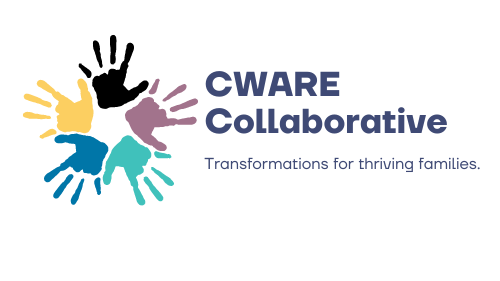Year 1
Originally Housed within First Focus and led by Aubrey Edwards-Luce, the CWARE Collaborative is a group of child welfare advocates – at the federal level – working together to promote the transformation of the child welfare system from one of family regulation into an anti-racist approach to family integrity and child safety.
On June 19, 2020, about a dozen child welfare policy experts came together to talk about the lessons that the child welfare field could learn from the nationwide calls to divest from policing as a community safety strategy. The CWARE Collaborative grew from that initial meeting.
From the very beginning the policy experts acknowledged that they were missing the leadership of youth and people with lived experience in the child welfare system. They started a very deliberate process of preparing for leaders with diverse perspectives to steer and coordinate their efforts to transform the child welfare system.
During the first year, the organizational members of the Collaborative operated three subgroups that met monthly:
P.O.D.C.A.S.T. – Producing Outward-facing Content on Anti-Racist System Transformation
This subgroup created public-facing virtual dialogues between stakeholders to introduce concepts and provoke deep conversations that advance policy and practices that will transform the child welfare system into tool for racial equity.
Reading and Discussion
This subgroup engaged in discussion around important written work on child welfare and racial equity with the goal of identifying possible policy reform and data needs. The group read Shattered Bonds and have acknowledged the need for updated data and more comprehensive data on the experiences of Latinx and Native American children and families.
History and Policy
This subgroup, using the Annie E. Case Foundation’s Race Equity Impact Assessment tool, drafted a process for analyzing child welfare policies with a racial equity framework and a tool for creating anti-racist child welfare policies in the future.
This time of learning allowed the organizational members to do the hard internal work of naming their own biases and identifying racist aspects of child welfare policies.
Year 2
In FY 2021, nine (9) lived experts teamed with five (5) subject matter experts to establish the Coordinating Committee. The Coordinating Committee was tasked with identifying values, principles, policy goals, and a theory of change to guide the Collaboratives efforts. Members of the Collaborative wanted their advocacy efforts for racial equity and justice to be centered on the lived experts’ experiences as youth of color in foster care, formal/informal kin caregivers, and parents whose children have been in foster care. Lived experts’ have drawn upon their experiences working towards different types of permanency, securing adequate mental health services, and keeping their loved ones out of the system to inform the recommendations and actions of the entire Collaborative.
The Coordinating Committee has been tasked with carrying out the following duties:
- Identify the values that will ground the Collaborative’s actions
- Develop the Collaborative’s Theory of Change
- Articulate principles for the development and evaluation of anti-racist child welfare policies and practices
- Facilitate discussion and networking amongst the Collaborative partners
- Circulate relevant info amongst the Collaborative participants
- Outline policy recommendations that advance the goals of the Collaborative with the help of other child welfare policy experts
- Inform the creation of strategic advocacy plans
- Amend the structure of the Collaborative as needed
The Coordinating Committee centers the expertise of leaders with experience in the child welfare system and leverages the expertise of subject matter experts who are federal advocates. The subject matter experts advocate for transformation inside the child welfare system and in other child and family serving systems whose failures often drive children and youth into foster care. As of September 2023, there are 10 lived experts and 4 subject matter experts who are participating in the Coordinating Committee.
